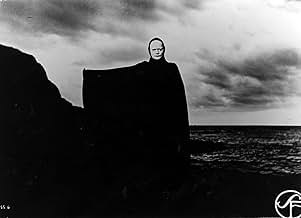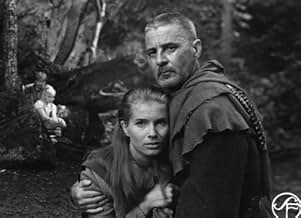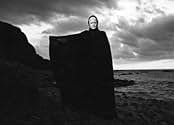एक व्यक्ति जीवन, मृत्यु और भगवान के अस्तित्व के बारे में उत्तर चाहता है क्योंकि वह ब्लैक प्लेग के दौरान ग्रिम रीपर के खिलाफ शतरंज खेलता है.एक व्यक्ति जीवन, मृत्यु और भगवान के अस्तित्व के बारे में उत्तर चाहता है क्योंकि वह ब्लैक प्लेग के दौरान ग्रिम रीपर के खिलाफ शतरंज खेलता है.एक व्यक्ति जीवन, मृत्यु और भगवान के अस्तित्व के बारे में उत्तर चाहता है क्योंकि वह ब्लैक प्लेग के दौरान ग्रिम रीपर के खिलाफ शतरंज खेलता है.
- पुरस्कार
- 9 जीत और कुल 2 नामांकन
Siv Aleros
- Flagellant
- (बिना क्रेडिट के)
Sten Ardenstam
- Knight
- (बिना क्रेडिट के)
Harry Asklund
- The Landlord
- (बिना क्रेडिट के)
Benkt-Åke Benktsson
- Merchant at the Inn
- (बिना क्रेडिट के)
सारांश
Reviewers say 'The Seventh Seal' delves into mortality, faith, and existential questions through its medieval setting. The chess game with Death symbolizes humanity's struggle against fate. Themes of societal chaos and religious fervor are depicted through plague, witch burnings, and flagellants. Characters like the knight, squire, and actors provide varied perspectives on life and death, enriching the narrative. The film's allegorical approach resonates with contemporary audiences, highlighting the timeless nature of its themes.
फ़ीचर्ड समीक्षाएं
THE SEVENTH SEAL is a film that presents a dramatic fantasy game between meaning of life and fear of death. A knight and his squire have returned to their country after a ten-year crusade. Deadly disease ravaged country. Knight faces Death. He calls Death on the multi-day game of chess...
The story has touched serious philosophical and religious topics. However, the story is full of intrigue, dark humor and hope. The protagonists are distracted between the vicious disease, self-pity and torture. It is interesting to see a deeply disillusioned knight, a cynical squire who hates women, a cheating wife, evil priests, a mute girl and seemingly healthy and happy family on the same road. The truth is all around them. The main protagonist used to persistently ask questions to which only he has a valid response. This film reveals some controversial issues. Is deadly disease greater threat to man or the man is the greatest enemy to himself? Mr. Bergman has painted realistic effects of fear, horror, cynicism, surprises, love and health on human faces.
Max von Sydow as Antonius Block, the knight is a more serious version of Don Quixote. Gunnar Björnstrand Jöns, the squire is a character who never changes his mood. He always has some sort of cynical jokes or words of contempt for each occurrence. Bengt Ekerot is Death in the true sense of that word. Nils Poppe as Jof is a juggler who has strange predictions. Fortunately, no one believes him. Bibi Andersson as Mia, Jof's wife is a beautiful and cheerful woman who does not fit into the landscape.
Life is a hard journey. The rare moments of happiness are a sort of salvation. The end of the film emphasizes the transience of life and the power of death which no one can escape. Of course, only in the eyes of one of the protagonists.
The story has touched serious philosophical and religious topics. However, the story is full of intrigue, dark humor and hope. The protagonists are distracted between the vicious disease, self-pity and torture. It is interesting to see a deeply disillusioned knight, a cynical squire who hates women, a cheating wife, evil priests, a mute girl and seemingly healthy and happy family on the same road. The truth is all around them. The main protagonist used to persistently ask questions to which only he has a valid response. This film reveals some controversial issues. Is deadly disease greater threat to man or the man is the greatest enemy to himself? Mr. Bergman has painted realistic effects of fear, horror, cynicism, surprises, love and health on human faces.
Max von Sydow as Antonius Block, the knight is a more serious version of Don Quixote. Gunnar Björnstrand Jöns, the squire is a character who never changes his mood. He always has some sort of cynical jokes or words of contempt for each occurrence. Bengt Ekerot is Death in the true sense of that word. Nils Poppe as Jof is a juggler who has strange predictions. Fortunately, no one believes him. Bibi Andersson as Mia, Jof's wife is a beautiful and cheerful woman who does not fit into the landscape.
Life is a hard journey. The rare moments of happiness are a sort of salvation. The end of the film emphasizes the transience of life and the power of death which no one can escape. Of course, only in the eyes of one of the protagonists.
This classic is filled with a lot of memorable images - from the opening scenes on the seashore to the effective concluding shots, creative thoughts are combined with some fine camera work. There are several significant or interesting questions raised by the characters - from the imagery of the "Seventh Seal" in Revelation, to their simple but important concerns about eternity - but it is the way that the visuals play off of the ideas that make the movie so worthwhile.
The recreation of the medieval world is convincing and effective, with a lot of detail to set off a varied assortment of characters with different personalities and perspectives. The characters are not necessarily very deep, but most are interesting, and are worth caring about. The ways that they deal with their discouraging situation make you wonder what it would have been like to live in their world. It's also a movie that in some respects is even better to watch over again, after you already know what has happened and can then pick up even more of the detail and imagery.
No doubt the somber tone and slow pace will always keep it from being widely popular, and it's not perfect, but it's satisfying in a different way, and deserves its reputation as a classic.
The recreation of the medieval world is convincing and effective, with a lot of detail to set off a varied assortment of characters with different personalities and perspectives. The characters are not necessarily very deep, but most are interesting, and are worth caring about. The ways that they deal with their discouraging situation make you wonder what it would have been like to live in their world. It's also a movie that in some respects is even better to watch over again, after you already know what has happened and can then pick up even more of the detail and imagery.
No doubt the somber tone and slow pace will always keep it from being widely popular, and it's not perfect, but it's satisfying in a different way, and deserves its reputation as a classic.
10Xstal
An abstraction of your fears, conjured progressively through years, walks beside you every day, may cause some to halt, then pray; it's a demon that's passed on, through generations come and gone, as fixed and certain as the tide, nowhere for you to run, or hide; is there a game that you can play, that extends your time and stay, with instructions and some rules, that don't leave you, as the fool; can the clock that's counting down, tick half as fast before you frown, and gaze with stoical askance, as you begin, your macabre dance.
Signed, sealed and delivered as many times as you may care for, but the curse of existence is never knowing how the story really ends, or why it was started in the first instance.
Signed, sealed and delivered as many times as you may care for, but the curse of existence is never knowing how the story really ends, or why it was started in the first instance.
One thing that can be certain after watching the Seventh Seal, outside of being thankful for living in this century, is that Bergman knows his film-making- and imagery. He uses subliminal and not so subliminal techniques to convey a dying, frightened world, where making a living is almost impossible and the debate of god's control over life is discussed like un-rhyming yet fascinating poetry.
The result is beautiful cinema, capturing the always foreboding fear and allure of the almighty and for the waiting death, appropriately staged in post-crusades, mid dark age Europe. Max Von Sydow gives an excellent showing as the opponent of Death (in a clever and meticulous chess game), yet the character of Death, played by Bengt Ekerot with chilling conviction, steals the show, if only for the alluring quality of the character.
Even if the story veers it veers in good and interesting territory, focusing on people who convey Bergman's point and or style. I can't reveal what the bottom line point is (many newcomers to Bergman's work won't either, especially if you're not in the mood for soul searching), but one thing is for certain, an allegory on life and death is shown perfectly in the second to last shot of the reaper and his minions following in a dance across the field. This is one of the most pure of cinema's masterpieces and certainly Bergman's best cine. A++
The result is beautiful cinema, capturing the always foreboding fear and allure of the almighty and for the waiting death, appropriately staged in post-crusades, mid dark age Europe. Max Von Sydow gives an excellent showing as the opponent of Death (in a clever and meticulous chess game), yet the character of Death, played by Bengt Ekerot with chilling conviction, steals the show, if only for the alluring quality of the character.
Even if the story veers it veers in good and interesting territory, focusing on people who convey Bergman's point and or style. I can't reveal what the bottom line point is (many newcomers to Bergman's work won't either, especially if you're not in the mood for soul searching), but one thing is for certain, an allegory on life and death is shown perfectly in the second to last shot of the reaper and his minions following in a dance across the field. This is one of the most pure of cinema's masterpieces and certainly Bergman's best cine. A++
Antonius Block - "Who are you?" Death - "I am Death." Antonius Block - "Have you come for me?" Death - "I have long walked by your side." Antonius Block - "So I have noticed."
The Seventh Seal, considered by some to be Ingmar Bergman's greatest achievement, is the desperate prayer of a sensitive, introspective, and insightful young man confused by the horrors of the world around him. Ingmar Bergman's films are often very deep, full of symbolism, philosophy, spirituality, emotion, and thought. The Seventh Seal is classic Bergman. Expressing his fear of life with no meaning, death with no understanding, and faith with no validity, Ingmar Bergman takes us deep into the well of his mind.
As the Black Plague ravages the world, a Antonius Block and his squire, Jons (Max Von Sydow and Gunnar Bjornstrand, respectively), return from fighting in the Crusades. They find their homeland devastated by the plague, their countrymen mad with fear, and their cause lost. Antonius Block is confronted by Death (Bengt Ekerot). Block challenges Death to a game of chess to provide him time to seek answers to the questions that plague his mind as Death has plagued his country. Death accepts, knowing that Block cannot escape his fate, and the two begin their game. As the story continues, Block and Jons meet with several testaments to the agony that the Black Death has brought upon their land. They find a young girl who is to be burned at the stake for having been with the Devil. They find madness in the eyes of all they meet, as everyone is convinced that God is angry and is punishing the world with the plague. They also find a small group of travelling actors, who appear to be the only souls to have remained sane in the midst of all of the death and fear. Block and Jons move across the countryside in the hopes of finding safety in Block's castle, but Death is always around the corner, biding his time.
Brilliantly conceived, and stunningly executed, Bergman's vision is brought to the screen through Gunnar Fischer's powerful cinematography creating images that will likely remain with you for the rest of your life. Strong performances from everyone involved bring humanity to the film. Max Von Sydow's brave and conflicted Antonius Block matching wits with Bengt Ekerot's sinister, omnipotent Death is a microcosm of the forces at work in this breath-taking interpretation of the mortal struggle.
A masterpiece!
The Seventh Seal, considered by some to be Ingmar Bergman's greatest achievement, is the desperate prayer of a sensitive, introspective, and insightful young man confused by the horrors of the world around him. Ingmar Bergman's films are often very deep, full of symbolism, philosophy, spirituality, emotion, and thought. The Seventh Seal is classic Bergman. Expressing his fear of life with no meaning, death with no understanding, and faith with no validity, Ingmar Bergman takes us deep into the well of his mind.
As the Black Plague ravages the world, a Antonius Block and his squire, Jons (Max Von Sydow and Gunnar Bjornstrand, respectively), return from fighting in the Crusades. They find their homeland devastated by the plague, their countrymen mad with fear, and their cause lost. Antonius Block is confronted by Death (Bengt Ekerot). Block challenges Death to a game of chess to provide him time to seek answers to the questions that plague his mind as Death has plagued his country. Death accepts, knowing that Block cannot escape his fate, and the two begin their game. As the story continues, Block and Jons meet with several testaments to the agony that the Black Death has brought upon their land. They find a young girl who is to be burned at the stake for having been with the Devil. They find madness in the eyes of all they meet, as everyone is convinced that God is angry and is punishing the world with the plague. They also find a small group of travelling actors, who appear to be the only souls to have remained sane in the midst of all of the death and fear. Block and Jons move across the countryside in the hopes of finding safety in Block's castle, but Death is always around the corner, biding his time.
Brilliantly conceived, and stunningly executed, Bergman's vision is brought to the screen through Gunnar Fischer's powerful cinematography creating images that will likely remain with you for the rest of your life. Strong performances from everyone involved bring humanity to the film. Max Von Sydow's brave and conflicted Antonius Block matching wits with Bengt Ekerot's sinister, omnipotent Death is a microcosm of the forces at work in this breath-taking interpretation of the mortal struggle.
A masterpiece!
क्या आपको पता है
- ट्रिवियाIngmar Bergman credited the film with helping him overcome his crippling fear of death. Because the film dealt so overtly with the subject, he found it a highly cathartic experience.
- गूफ़The chess players focus on capturing the Queen. The Queen was not a super-powerful piece until centuries later when a recent chess-variant initially called "chess of the mad queen" became more popular than the classic game.
- भाव
Antonius Block: We must make an idol of our fear, and call it god.
- कनेक्शनEdited into Severed Ways: The Norse Discovery of America (2007)
टॉप पसंद
रेटिंग देने के लिए साइन-इन करें और वैयक्तिकृत सुझावों के लिए वॉचलिस्ट करें
विवरण
- रिलीज़ की तारीख़
- कंट्री ऑफ़ ओरिजिन
- भाषाएं
- इस रूप में भी जाना जाता है
- Det Sjunde Inseglet
- फ़िल्माने की जगहें
- Hovs Hallar - Naturreservat, Skåne län, स्वीडन(Opening beach scene and ending scene)
- उत्पादन कंपनी
- IMDbPro पर और कंपनी क्रेडिट देखें
बॉक्स ऑफ़िस
- बजट
- $1,50,000(अनुमानित)
- दुनिया भर में सकल
- $3,12,104
- चलने की अवधि
- 1 घं 36 मि(96 min)
- रंग
- पक्ष अनुपात
- 1.37 : 1
इस पेज में योगदान दें
किसी बदलाव का सुझाव दें या अनुपलब्ध कॉन्टेंट जोड़ें























